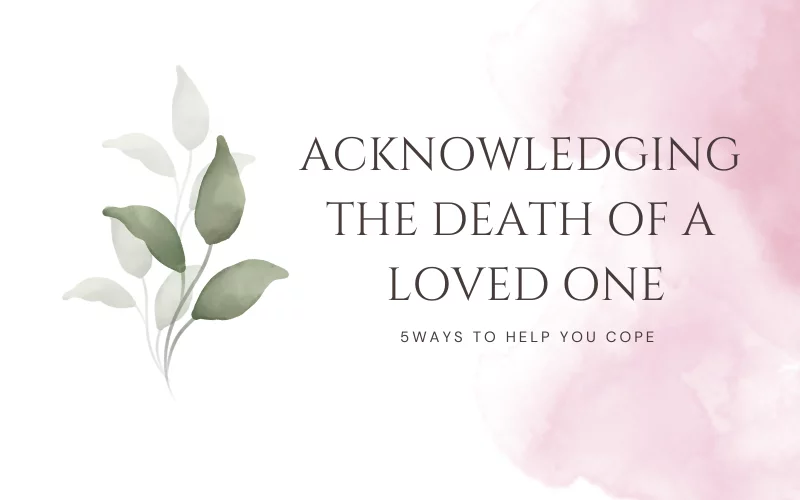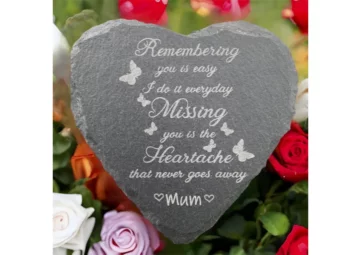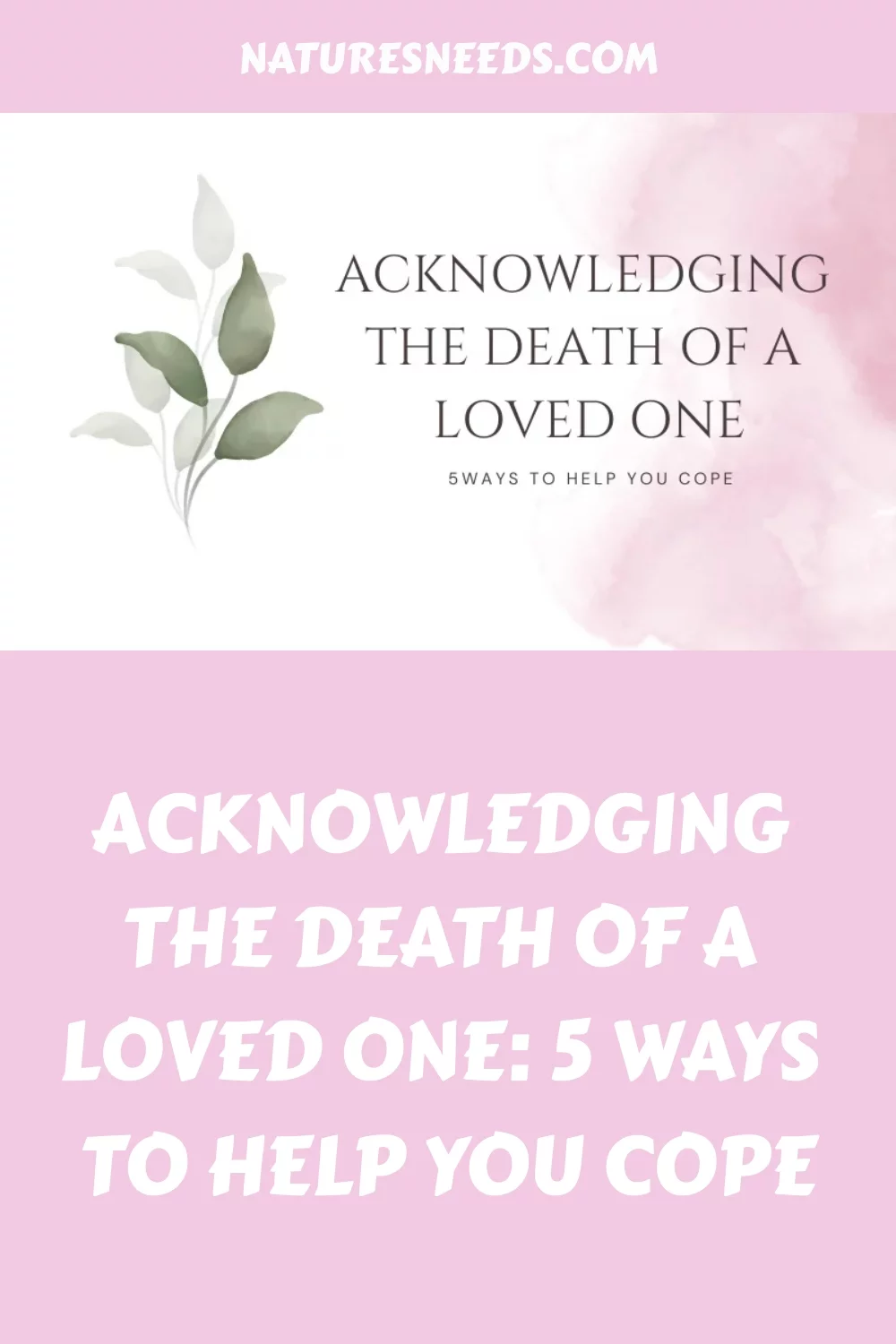
Acknowledging the death of a loved one is a bittersweet experience. It’s not something we want to do, but it is essential if we are ever going to heal and deal with the loss of a loved one.
Death is such a natural part of life, but it can be a traumatic experience which leaves those left behind bereft, heartbroken and feeling like they can’t go on.
No matter how hard we try to prepare ourselves for the loss of a loved one, death still comes as a shock.
We tell ourselves that we are coping with the death of a loved one, but the truth is for some of us it can be hard to move on and get on with life. Many feel that the pain of the loss is too great to cope with. Which is why it’s important to take some time to come to terms with the death of someone and why it’s so important to fully acknowledge the death of a loved one and all that it means to you.
In the UK there is still a taboo around death. This can also make it difficult to talk about and acknowledge the death of a loved one.
Acknowledging the Death of a Loved One
Recently, a good friend of mine was forced into fully accepting the loss of her husband.
The truth was, even though he had died almost 12 months ago, she had been in death denial, which made it hard to acknowledge the death of her loved one.
They had been married for over 5o years and whilst death was on the horizon, it came much earlier than expected.
In June 2022, her husband had been taken ill with chest pains and rushed into hospital. He was told that he must have immediate heart surgery. The surgery was successful and things were looking good until complications set in. He died a few weeks later in the middle of July. She was deeply upset at losing the love of her life, but more trauma was to come.
Although they were British, they had spent the last 20 years living in a large villa by the sea in Bulgaria. Now, with her husband gone, she was no longer able to look after the villa or herself. The villa was put on the market, but there was little interest. For a whole year she cleaned and tidied around her husband’s things and took care of his much loved dog. His clothes remained in the wardrobe and his shoes on the shoe rack. Every day, she would sit on his side of the bed and talk to him.
As the anniversary of his death approached, a buyer appeared. Within an hour a sale had been agreed.
Suddenly, she was faced with the prospect of packing up and moving back to the UK with his ashes.
She realised that she had been in death denial. Every day cleaning around his things and talking to him as if he were still alive.
The sale forced her to confront her loss. She was forced into acknowledging the death of a loved one. Pain of the loss came rushing to the surface. It was clear that words of sympathy would not make things better.
In this situation, it can be difficult to find the right words, however, acknowledging their loss will never make things worse.
Everyone experiences grief differently. The important thing is to show support for the bereaved. It’s important to let them know that you understand the pain of the loss, to focus on the bereaved person and acknowledge their loss. This will bring comfort, and it’s better than saying nothing.

Etsy: Helen Jones StampedALot
The Importance of Acknowledging The Death Of A Loved One
Acknowledging a loss is an important step in the grief process. It entails fully recognising the death of a loved one.
This may seem obvious, and a stupid thing to say, but it is an important step in the grieving process.
Someone has died. It could be a close friend or a family member. You had a relationship with the person and that is something that never goes away. It is important to acknowledge and accept the reality of losing someone before moving forward.
Five Ways To Acknowledge the Death of a Loved One
1. Allow yourself to feel the emotions: It is essential to give yourself permission to feel the emotions associated with the loss. Death and grief can cause many reactions. It may include sadness, anger, confusion, or even relief. It is not unusual for people to feel very angry.
People often struggle with experiencing strong emotion but don’t be afraid.
For example, the person who is grieving may experience a great deal of anger even though they are not an angry person. People struggle to cope with the intensity of these unfamiliar emotions.
They are perfectly normal reactions for many bereaved people. By acknowledging the death of a loved one and accepting these emotions, you can begin to process them and move forward.
2. Be honest with yourself: It is necessary to be honest about the impact the loss has had on you.
Don’t downplay or ignore the significance of the loss. Death and bereavement have a huge impact on our lives. Instead, acknowledge the void that has been created and recognise the feelings that come with it.
3. Share your feelings: Talk to someone you trust about your loss and how it has affected you.
This could be a friend, family member, or therapist. Sharing your thoughts and emotions can provide a supportive outlet and help you acknowledge your loss more fully.
If you don’t feel like talking you may wish to try journaling or singing as alternative ways to express your emotions and acknowledge the death of a loved one.
4. Create a ritual: Consider creating a personal ritual or ceremony to honour the deceased person.
This could involve lighting a candle, writing a letter to the person or thing you’ve lost, or visiting a specific place that holds meaning for you. These rituals can help you acknowledge the loss and remember the relationship with the person and find a sense of closure.
5. Practice self-compassion: Treat yourself with kindness and understanding during this time.
Grief can be overwhelming, and it’s important to give yourself space and time to heal. Practice self-care activities that bring you comfort and provide an opportunity for reflection and allow what you’re thinking to be fully expressed.
6. Seek support: Join a support group or seek professional help if needed.
There are lots of free online resources for example, the Marie Curie bereavement support helpline. Surrounding yourself with others who have experienced similar losses can provide validation and understanding. Try a visit to a Death Cafe. Death cafes offer you the opportunity to talk to people who are going through the same situation as you. They are not morbid and depressing. They are positive uplifting experiences that people find helpful and beneficial.
Therapists or counsellors specialised in grief can also provide guidance and support in acknowledging the death of a loved one. They can help you to process your loss. Knowing that other people are going through the same as you can help make things better over time.
Final Thoughts
Remember, acknowledging the death of a loved one is a personal and unique experience.
Everyone grieves differently, and it is essential to find the methods and resources that work best for you. It can be hard to know how to deal with the death of a loved one. It’s important to know that death is one of the most painful experiences we will ever have to come to terms with, so give yourself time and space to acknowledge your loss and be patient with yourself throughout the process.
Generated with Pin Generator
FUNERAL QUOTES
Get The Little Book Of Spiritual Quotes For Funerals
- Never be stuck for words
- Express your thoughts & feelings
- Create a beautiful funeral


